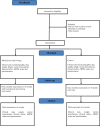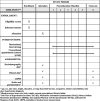Effect of motivational interviewing in hypertensive patients (MIdNIgHT): study protocol for a randomized controlled trial
- PMID: 31288854
- PMCID: PMC6617897
- DOI: 10.1186/s13063-019-3486-1
Effect of motivational interviewing in hypertensive patients (MIdNIgHT): study protocol for a randomized controlled trial
Abstract
Background: Only one-third of hypertensive patients achieve and maintain blood-pressure control. This is attributed to low treatment adherence and has a negative impact on clinical outcomes. Adherence is multidimensional and involves aspects both related to patient characteristics and to the chronic nature of the disease. In this context, motivational interviewing has been proposed as an approach to foster patients' motivations to change their behavior for the benefit of their own health, thus providing more lasting behavioral changes.
Design and methods: Single-center, parallel, randomized controlled trial with outcome-assessor blinding. This study will select adult patients (n = 120) diagnosed with hypertension who receive regular follow-up in a specialized outpatient clinic. Patients will be randomly allocated across two groups: the intervention group will have appointments focused on motivational interviewing, while the control group will have traditional appointments. Patients will be monitored face-to-face, once monthly for six months. The primary outcomes will be a reduction of at least 8 mmHg in systolic blood pressure and changes in mean blood pressure measured by 24-h ambulatory blood pressure monitoring. Secondary outcomes include improvement of adherence to a low-sodium diet, adherence to self-care behaviors, regular use of antihypertensive medications, increase or maintenance of physical activity, weight reduction, evaluation of changes in daytime sleepiness, and cessation of smoking.
Discussion: This study shows an intervention strategy that will be tested and, if effective, warrant replication in monitoring of other chronic diseases.
Trial registration: ClinicalTrials.gov, NCT02892929 . Registered on 24 August 2016.
Keywords: Hypertension; Lifestyle; Motivational interviewing; Nursing; Randomized clinical trial.
Conflict of interest statement
The authors declare that they have no competing interests.
Figures
References
-
- James PA, Oparil S, Carter BL, Cushman WC, Dennison-Himmelfarb C, Handler J, et al. 2014 evidence-based guideline for the management of high blood pressure in adults: report from the panel members appointed to the Eighth Joint National Committee (JNC 8) JAMA. 2014;311:507–520. doi: 10.1001/jama.2013.284427. - DOI - PubMed
-
- Heymann AD, Gross R, Tabenkin H, Porter B, Porath A. Factors associated with hypertensive patients compliance with recommended lifestyle behaviors. Isr Med Assoc J. 2011;13:553–557. - PubMed
Publication types
MeSH terms
Substances
Associated data
LinkOut - more resources
Full Text Sources
Medical



